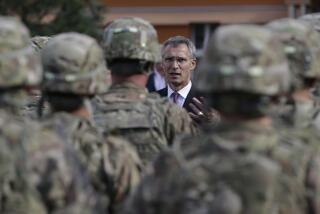Special Czech Unit to Join U.S. Anti-Terror Effort
- Share via
PRAGUE, Czech Republic — A Czech anti-chemical warfare unit that gained recognition for its work during the Persian Gulf War is preparing to take part in the U.S.-led campaign against terrorism.
Plans to deploy the unit, which specializes in the detection of nerve agents and the decontamination of troops and equipment, were announced this month by Czech Defense Minister Jaroslav Tvrdik. The core of the 300-strong Czech force will be drawn from a 158-member anti-chemical unit, which will be supplemented by other soldiers providing logistical support and combat protection, Tvrdik said.
The well-equipped, well-trained unit is capable of “warning endangered forces and populations” of chemical and radiation threats, the Defense Ministry said in a written statement.
The unit also will be capable of countering the effects of biological warfare, Jiri Sedivy, chief of the Czech army general staff, told reporters.
A team of 35 medical workers trained to “search out and identify biological weapons” will be part of the unit when it is sent into action, Jan Petras, chief of the Czech army’s medical service, said in remarks quoted Friday by Pravo, a leading daily newspaper.
Tvrdik said details of the unit’s mission are classified. He implied that the Czechs would not be sent to the front lines in Afghanistan but said they could face danger. Czech media reported that the warfare unit probably will be sent to Uzbekistan or Pakistan.
Czech Prime Minister Milos Zeman volunteered use of the unit in early October, and U.S. Ambassador Craig Stapleton accepted the offer early this month.
Public support for Czech participation in the anti-terrorism effort runs high here. A Sofres-Factum poll conducted in September showed 81% of respondents were in favor of the country providing armed assistance to the U.S.
The Czech Republic joined the North Atlantic Treaty Organization in 1999, and the anti-chemical unit already was part of NATO’s rapid-reaction forces.
Concern about the possible use of chemical or biological weapons by Afghanistan’s ruling Taliban has been heightened because the Taliban has made false claims that U.S. forces are using chemical weapons in that country, reported Mlada Fronta Dnes, a leading Czech daily. It is feared that this may signal a Taliban effort to prepare a justification for use of chemical or biological weapons, the newspaper said.
The Czech anti-chemical unit is viewed with great pride here because of its performance against Iraq in the Persian Gulf War. Its reports of finding traces of nerve and mustard gas in the opening days of the 1991 war initially were dismissed by U.S. military officials, but in 1993 the Pentagon formally acknowledged the accuracy of the Czech findings.
After U.S. military officials went to Prague in 1993 to review the unit’s work, then-Defense Secretary Les Aspin told reporters that, “based on this assessment and an examination of the available records, team members concluded that the Czech detections were valid.” But Aspin and other U.S. officials firmly rejected claims that illnesses reported by returning Gulf War veterans could have been caused by the traces of gas found by the Czechs.
Sources for the chemicals detected by the Czech unit were never established, but most explanations attributed the findings to allied bombing of facilities where Iraqi chemical weapons had been stored. Other reports speculated that in some cases the chemicals may have come from Iraqi-launched Scud missiles. It was never proved that Iraq used chemical weapons during the war.
Czech competence in chemical warfare detection dates to the days of Czechoslovakia’s membership in the Soviet-dominated Warsaw Pact. Pride in the unit’s performance in the Gulf War helped ensure that it continued to receive sufficient resources and training throughout the 1990s.
A plan for reform of the Czech army released by the government in September envisions at least a doubling in size of the anti-chemical warfare unit.
Valstimila Cyprisova, a unit spokeswoman, told the Czech News Agency that U.S. interest may have been stimulated by the unit’s performance in recent NATO maneuvers in Turkey.
Company commander Jiri Gajdos told the news agency after his return from those October exercises that the unit had proved to NATO allies that its equipment and troops were reliable. It was now ready, he said, “to fulfill possible alliance tasks connected with retaliatory steps against Afghanistan.”
*
Times staff writer Holley recently reported from Warsaw, and special correspondent Drapalova reported from Prague.
More to Read
Sign up for Essential California
The most important California stories and recommendations in your inbox every morning.
You may occasionally receive promotional content from the Los Angeles Times.











